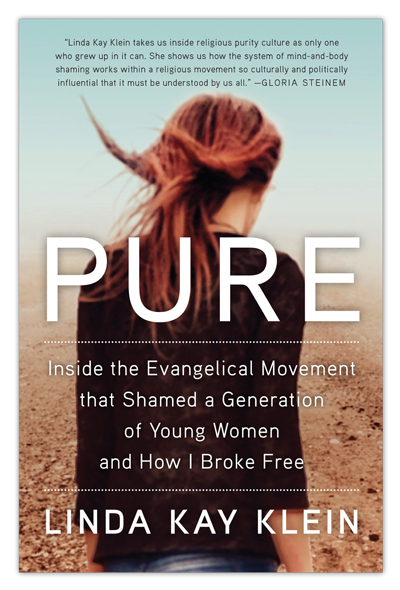
Linda Kay Klein was raised within the evangelical culture during the purity movement. When she found herself too attracted to her high school boyfriend, she convinced herself that God wanted her to break up with him to show her devotion, as that was an easier concept to understand rather than that sexual attraction is normal and healthy. Just out of high school, she learned that her youth pastor had been a pedophile and a young girl in her youth group had been his victim, and Klein first begins to question purity culture. In early adulthood, she still finds herself bound to it. When she begins some sexual experimentation with her boyfriend, she obsessively takes pregnancy tests, even though she is still a virgin. Ultimately, her questioning led her to graduate studies where she wrote her thesis on white American evangelicalism’s gender and sexuality messaging for girls. It also led her to conduct interviews with women raised in purity culture about their experiences. Those interviews, coupled with her own experiences, became the book that is Pure. The interviewed women ranged in age from the early twenties to the early forties, and all are white evangelical females unless otherwise noted.
Pure is part of a greater backlash against purity culture that has been underway among current and former evangelicals. Even Josh Harris, author of the infamous I Kissed Dating Goodbye and golden boy of ‘90s evangelical circles, decided against continuing publication of his own defining book, which told an entire generation of evangelicals how to approach romance, marriage, and sex, even though he was a homeschooled 21-year-old when he wrote it. While Klein is not the first to point out the ill effects of the purity movement, she has possibly done it best by giving voice to many women and by explaining the psychological effects of the purity movement.
Klein explores the inconsistencies of purity culture, how girls are told if they just keep themselves pure and sexless before marriage, they will instantly enjoy a fulfilling sex life upon marrying, as that is God’s blessing upon upright young couples. One woman Klein interviews married very young, as she and her husband were eager to go to bed together. Having a strong sense of purity, they waited until they were at the altar to have their first kiss, a mortifying and very public experience that involved clanking teeth, only to find their total ignorance of sex kept them from having a satisfying sex life for several years. That is quite possibly the most extreme story in the book, but it is likely not uncommon among evangelical circles, given that even thinking about sex before marriage can be frowned upon, as thoughts are considered to be a reflection of the soul. With that type of expectation, for a “pure” couple to successfully have great sex on their wedding night, they would need to be a pair of prodigies.
Many of the stories are those you would expect to find in a book like this: One woman was raped by her brother, only to have her parents blame her for “enticing” her brother. There is a lot said of women being “stumbling blocks,” the classic cliche of the evangelical world, where women are blamed for the lustful thoughts of men. Klein points out this is a misinterpretation of scripture, as only one Biblical reference to stumbling blocks refers to sexual desire, and in that reference, it is the lustful eye that is described as the stumbling block, not the object of desire.
As someone who grew up in a fundamentalist church, I related to this book. Lately, I have been thinking of how my early religious upbringing has formed me. The best of me can easily be credited to my childhood church and to my parents. That is where I learned about service, community, and what it means to live selflessly. There are other things–critical thinking and social justice, for instance–I have had to learn for myself as an adult because they were notably not taught at church or at home. There is also damage. All of the trauma and sexual anxiety that Klein describes I recognize in my own life. There was also a spiritual trauma completely separate from the purity culture. As someone who is prone to doubt and genetically prone to anxiety, growing up in a church that regularly liked to share the bad news about hellfire was probably not the best for my mental health.
I do strongly recommend Pure. The obvious audience is those who have grown up in evangelical or fundamentalist homes, but I think this is relevant outside that subculture. Purity culture can be seen in gender-specific school dress codes. The belief that women are “stumbling blocks” to men is at the root of the Me Too “anxiety” that men can’t mentor women in the workplace because women are too distractingly sexy or because they are Eves who might falsely accuse them of sexual harassment.
FCC Notice: I bought my own copy.
book review blogs
@Barrie Summy

Wow. I read your review and ordered this book from my library. (I’ve bought far too many books lately. 🙂 ) Thank you for reviewing and thank you for sharing your personal experiences. I married into a fundamentalist family, and all this really has me thinking.
LikeLike
This sounds like an important book for women to read. Thanks for sharing your own experiences as well as a great review. Tweeted and shared on Facebook.
LikeLike
Excellent review! I had been wondering about this book. I’m sorry you had to experience the harmful parts of your faith, but it’s good that you gained some positive outlooks from your church too. I hope this book helps you and others heal.
LikeLike
Wow, great review. It sounds like it might be a hard read though. Thanks for reviewing.
LikeLike
Sounds like a powerful book that may be difficult to read for some people. – Margy
LikeLike